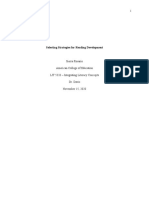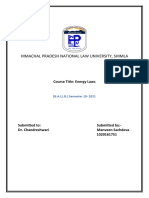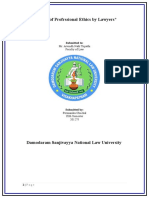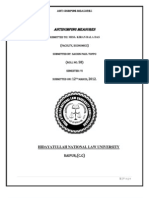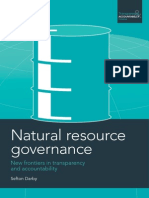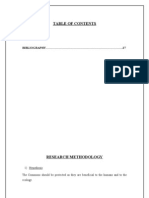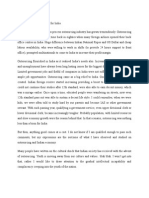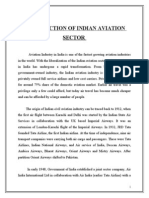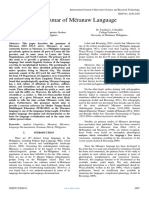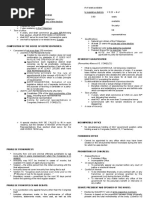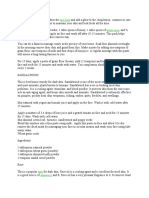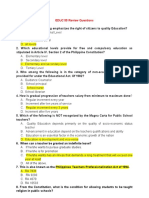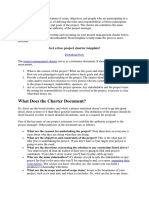Introduction of Multilateral Investment Guarantee Agency (Miga)
Introduction of Multilateral Investment Guarantee Agency (Miga)
Uploaded by
Minal DalviCopyright:
Available Formats
Introduction of Multilateral Investment Guarantee Agency (Miga)
Introduction of Multilateral Investment Guarantee Agency (Miga)
Uploaded by
Minal DalviOriginal Description:
Original Title
Copyright
Available Formats
Share this document
Did you find this document useful?
Is this content inappropriate?
Copyright:
Available Formats
Introduction of Multilateral Investment Guarantee Agency (Miga)
Introduction of Multilateral Investment Guarantee Agency (Miga)
Uploaded by
Minal DalviCopyright:
Available Formats
MULTILATERAL INVESTMENT GUARANTEE AGENCY
1. INTRODUCTION OF MULTILATERAL INVESTMENT
GUARANTEE AGENCY (MIGA)
MIGA was established in 1988. Its main purpose is to promote the flow of foreign direct
investment among member countries by insuring investments against non-commercial
(political) risk, and by providing promotional and advisory services to help member
countries create an attractive investment climate. MIGA offers four basic types of
coverage:
Currency Inconvertibility. Protects against losses arising from an inability to convert
local currency investment returns into foreign exchange for transfer outside the host
country;
Expropriation. Protects against loss from acts by the host government that may reduce
or eliminate ownership of, or control over, rights to the insured investment;
War and Civil Disturbance. Protects against losses arising from military action or civil
disturbance that destroys or damages tangible assets of the project enterprise or
interferes with its operations; and
Breach of Contract. Protects against losses from the investor's inability to obtain and/or
enforce a decision or award against a host country that has repudiated or breached an
investment contract.
Since its inception, MIGA has issued more than 500 guarantees for projects in 78
developing countries. As of June 2001, total coverage issued exceeded US $9 billion,
bringing the estimated amount of foreign direct investment facilitated since inception to
more than US $41 billion. As of 30 September 2002, 159 countries had completed
25
MULTILATERAL INVESTMENT GUARANTEE AGENCY
membership requirements with an additional 11 countries in the process of becoming
members.
Considerable attention has been focused in recent years on the need to remove barriers impeding
the growth of foreign investment in developing countries. Many countries have enacted new laws
to promote foreign investment and entered into bilateral investment treaties with capitalexporting countries for this purpose.
The concept of providing foreign investors with financial guarantees against non-commercial
risks in developing countries has emerged as a means of improving the investment climate in
these countries and, hence, of stimulating investment flows to them. Almost all developed
countries and two developing countries have established official schemes to provide guarantees
against noncommercial risks to their nations for investments into developing countries. In
addition, the Inter Arab Investment Guarantee Corporation provides guarantees on a regional
basis. A private political risk insurance market has also been operating internationally for over a
decade. The activities of these entities are subject to several limitations and the perception of
political risk remains a significant barrier to investment in developing countries. There is need
for a multilateral investment guarantee agency to complement these schemes and improve the
investment climate by issuing guarantees and engaging in other investment promotion activities.
The idea of establishing a multilateral investment guarantee agency emerged in the 1950s. It was
discussed in the International Bank of Reconstruction and Development (referred to in the
Commentary as the Bank) on several occasions during the 1962-1972 periods, but no decision
was taken about creating such an agency. President Clausen revived the concept in his first
address to the Bank's Annual Meeting in 1981. After detailed studies by the Bank staff and
informal discussions with the Bank's Executive Directors, a paper entitled "Main Features of a
Proposed Multilateral Investment Guarantee Agency" was distributed to the Executive Directors
in May 1984. The paper presented a number of key features distinguishing the proposal from the
schemes previously discussed in the Bank. This proposal, with modifications following
discussions with the Executive Directors, was subsequently embodied in a "Draft Outline of the
Convention Establishing the Multilateral Investment Guarantee Agency," which was circulated in
October 1984. On the basis of that document, consultations were held with member governments
25
MULTILATERAL INVESTMENT GUARANTEE AGENCY
of the Bank. These consultations resulted in a revised draft of the Convention which was
circulated to the member governments in March 1985. Between June and September 1985, the
Executive Directors, assisted by experts from member governments, convened in a Committee of
the Whole to discuss the draft Convention. In September 1985, the Executive Directors finalized
the draft Convention and recommended to the Board of Governors that it adopt a resolution
opening the Convention for signature.
25
MULTILATERAL INVESTMENT GUARANTEE AGENCY
2. SECTORAL OVERVIEW
MIGA guarantees cover projects in a broad range of sectors and subsectors, with projects in
infrastructure accounting for the largest share (41 percent) of the agencys outstanding portfolio
in fiscal year 2008. More than 37 percent of the agencys gross exposure this year was in the
financial sector. Financial sector development plays an important role in the successful
integration of transitional economies. With MIGAs support, these economies are benefiting from
the presence of experienced foreign banking institutions, in terms of establishing best practices,
introducing new technologies, developing new products, reaching out to underserved consumers,
and in general, fostering competition. Oil, gas and mining accounted for over 9 percent, and
agribusiness, manufacturing, and services accounted for nearly 13 percent of the agencys gross
exposure
A. Policies overview
MIGAs work is guided by policies and standards designed to ensure that the projects it supports,
or is considering supporting, are disclosed in a transparent manner; meet international bestpractice environmental and social standards; and are free of corruption. During the underwriting
of a project, MIGA identifies the policies and guidelines that are applicable to a project. Projects
are expected to comply with those policies and guidelines, as well as applicable local, national,
and international laws.
On October 1, 2007, MIGA instituted a new Policy on Disclosure of Information, as well as new
Policy and Performance Safeguards on Social and Environmental Sustainability. The new
policies benefited from international consultations with government officials, nongovernmental
organization representatives, investors and lenders, and others.
25
MULTILATERAL INVESTMENT GUARANTEE AGENCY
MIGAs anti-corruption and anti-fraud standards, which took effect in October 2006, are part of
an overall World Bank Group effort to establish higher standards for sustainability and corporate
governance in the projects it supports.
B. Guarantee overview
Investors and lenders in today's dynamic investment climate understand the potential benefits of
investing in emerging markets. The even smarter ones also understand the critical importance of
addressing the political risks that may accompany an investment in an untested environment.
MIGA can help investors and lenders deal with these risks by insuring eligible projects against
losses relating to:
Currency transfer restrictions
Expropriation
War and civil disturbance
Breach of contract
(a) Transfer restriction coverage protects against losses arising from an investor's inability to
convert local currency (capital, interest, principal, profits, royalties, or other monetary benefits)
into foreign exchange for transfer outside the host country. The coverage also insures against
excessive delays in acquiring foreign exchange caused by the host government's actions or
failure to act. Currency devaluation is not covered.
(b) Expropriation coverage offers protection against loss of the insured investment as a result
of acts by the host government that may reduce or eliminate ownership of, control over, or rights
to the insured investment. This policy also covers partial losses, as well as "creeping
expropriation," a series of acts that over time have an expropriatory effect. Bona fide, nondiscriminatory measures taken by the host government in the exercise of its legitimate regulatory
authority are not considered expropriatory.
25
MULTILATERAL INVESTMENT GUARANTEE AGENCY
(c) War and civil disturbance coverage protects against loss due to the destruction,
disappearance, or physical damage to tangible assets caused by politically motivated acts of war
or civil disturbance, etc.Terrorism and sabotage are also covered. War and civil disturbance
coverage also extends to events that result in the total inability of the project enterprise to
conduct operations essential to its overall financial viability.
(d) Breach of contract coverage protects against losses arising from the host government's
breach or repudiation of a contractual agreement with the investor. In the event of such an
alleged breach or repudiation, the investor must be able to invoke a dispute resolution
mechanism (e.g., arbitration) set out in the underlying contract and obtain an award for damages.
The investor may file for a claim if, after a specified period of time, payment is not received.
C. ELIGIBILITY
Eligible investors include nationals of any MIGA member country, provided they are not
nationals of the country where the investment is being made. Under certain conditions, however,
investments made by nationals of the host country may also be eligible. A corporation is eligible
for coverage if it is either incorporated and has its principal place of business in a member
country, or if it is majority-owned by nationals of member countries. A state-owned corporation
is eligible if it operates on a commercial basis.
MIGA insures new cross-border investments originating in any MIGA member country, destined
for any developing member country. New investment contributions associated with the
expansion, modernization, or financial restructuring of existing projects are also eligible, as are
acquisitions that involve the privatization of state-owned enterprises. New investments are those
that have neither been made nor irrevocably committed by the time the investor submits a
preliminary application for guarantee to MIGA. Other investments may be eligible and are
considered on a case-by-case basis. Projects that MIGA cannot guarantee are described in
MIGA's Exclusion List.
Types of foreign investments that can be covered include equity, shareholder loans, and
shareholder loan guaranties, provided the loans have a minimum maturity of three years. Loans
to unrelated borrowers can be insured, provided a shareholder investment in the project is
insured concurrently or has already been insured. Other forms of investment, such as technical
25
MULTILATERAL INVESTMENT GUARANTEE AGENCY
assistance and management contracts, and franchising and licensing agreements, may also be
eligible for coverage.
In keeping with MIGA's objective of promoting economic growth and development, investment
projects must be financially and economically viable, environmentally sound, and consistent
with the labor standards and other development objectives of the country hosting the investment.
3. FEATURES OF MULTILATERAL INVESTMENT
GUARANTEE AGENCY
A. Confidence, security, and credibility. MIGA gives private investors the confidence and
comfort they need to make sustainable investments in developing countries. As part of the World
Bank Group, and having as our shareholders both host countries and investor countries, MIGA
brings security and credibility to an investment that is unmatched. MIGAs presence in a
potential investment can literally transform a "no-go" into a "go." MIGA act as a potent deterrent
against government actions that may adversely affect investments. And even if disputes do arise,
its leverage with host governments frequently enables us to resolve differences to the mutual
satisfaction of all parties.
B. Market leader. MIGA is a leader when it comes to assessing and managing political risks,
developing new products and services, and finding innovative ways to meet client needs. But we
don't stop there. MIGA also provide expert advice to help countries attract and retain quality
foreign investment, and a host of online services to make sure investors know about business
opportunities in our developing member countries.
C. Complex deals. MIGA can be the difference between make or break, by providing that allcritical lynchpin that enables a complex transaction to go ahead. MIGA offers innovative
coverage of the nontraditional sub-sovereign risks that often accompany water and other
infrastructure projects. MIGA can also cover interest rate hedging instruments, as it did for a
power project in Vietnam, as well as provide capital markets guarantees, which were recently
done for residential mortgage-backed securities in Latvia.
25
MULTILATERAL INVESTMENT GUARANTEE AGENCY
D. PRI market. MIGA complements the activities of other investment insurers and works with
partners through its coinsurance and reinsurance programs. By doing so, MIGA able to expand
the capacity of the political risk insurance industry to insure investments, as well as to encourage
private sector insurers into transactions they would not have otherwise undertaken.
4. DEVELOPMENT IMPACT AND PRIORITIES
Since its inception in 1988, MIGA has issued nearly 900 guarantees worth more than $17.4
billion for projects in 96 developing countries. MIGA is committed to promoting socially,
economically, and environmentally sustainable projects that are above all, developmentally
responsible. They have widespread benefits, for example, generating jobs and taxes, and
transferring skills and know-how. Local communities often receive significant secondary
benefits through improved infrastructure. Projects encourage similar local investments and spur
the growth of local businesses. We ensure that projects are aligned with World Bank Group
country assistance strategies, and integrate the best environmental, social, and governance
practices into our work.
MIGA specializes in facilitating investments in high-risk, low-income countriessuch as in
Africa and conflict-affected areas. By partnering with the World Bank and others, MIGA is able
to leverage finance for guarantee trust funds in these difficult or frontier markets. The agency
also focuses on supporting complex infrastructure projects and promoting investments between
developing countries.
MIGA's technical assistance services also play an integral role in catalyzing foreign direct
investment by helping developing countries define and implement strategies to promote
investment. MIGA develops and deploys tools and technologies to support the spread of
information on investment opportunities. Thousands of users take advantage of our suite of
online investment information services, which complement country-based capacity-building
work.
25
MULTILATERAL INVESTMENT GUARANTEE AGENCY
The agency uses its legal services to further smooth possible impediments to investment.
Through its dispute mediation program, MIGA helps governments and investors resolve their
differences, and ultimately improve the country's investment climate.
5. MIGA and FDI
The development needs today are stark. Billions of people live without access to safe drinking
water or sewage treatment. Children can't attend school because there's no electricity to light
classrooms in some countries, and no roads to get to school in others. The list goes on.
Developing country governments cannot shoulder the burdenfinancially or technicallyof
addressing these needs alone.
Foreign direct investors can play a critical role in reducing poverty, by building roads, for
example, providing clean water and electricity, and above all, providing jobs. By taking on these
tasks, the private sector can help economies grow and avert the need for governments to use
funds better spent on acute social needs, while taking advantage of the opportunity to make
profitable investments.
Concerns about investment environments and perceptions of political risk often inhibit foreign
direct investment, with the majority of flows going to just a handful of countries and leaving the
world's poorest economies largely ignored. MIGA addresses these concerns by providing three
key services: political risk insurance for foreign investments in developing countries, technical
assistance to improve investment climates and promote investment opportunities in developing
countries, and dispute mediation services, to remove possible obstacles to future investment.
MIGA's operational strategy plays to our foremost strength in the marketplaceattracting
investors and private insurers into difficult operating environments. The agency's strategy
focuses on specific areas where we can make the greatest difference: Infrastructure development
is an important priority for MIGA, given the estimated need for $230 billion a year solely for
25
MULTILATERAL INVESTMENT GUARANTEE AGENCY
new investment to deal with the rapidly growing urban centers and underserved rural populations
in developing countries. Frontier marketshigh-risk and/or low-income countries and markets
represent both a challenge and an opportunity for the agency. These markets typically have the
most need and stand to benefit the most from foreign investment, but are not well served by the
private market. Investment into conflict-affected countries is another operational priority for the
agency. While these countries tend to attract considerable donor goodwill once conflict ends, aid
flows eventually start to decline, making private investment critical for reconstruction and
growth. With many investors wary of potential risks, political risk insurance becomes essential to
moving investments forward. South-South investments (investments between developing
countries) are contributing a greater proportion of FDI flows. But the private insurance market in
these countries is not always sufficiently developed and national export credit agencies often lack
the ability and capacity to offer political risk insurance.
25
MULTILATERAL INVESTMENT GUARANTEE AGENCY
6. PROJECT CYCLE
I Submission of preliminary application: MIGAs project cycle begins when the client submits
a Preliminary Application. The application is free, confidential and short. In order to be eligible
for MIGA coverage, the investment must be considered new, meaning the application must be
submitted before an investment is irrevocably committed.
II Determination of eligibility criteria: The Preliminary Application gives the agency a chance
to determine early on whether the project meets MIGAs eligibility criteria.
III. Submission a Definitive Application Once a project is deemed to be eligible for MIGAs
guarantee coverage, the client may submit a Definitive Application, which includes a refundable
application fee and non-refundable processing fee.
IV Thorough review: MIGAs thorough review of the project. MIGAs underwriting team
discusses the project with the client in detail, helping to identify environmental and social impact
assessments that need to be undertaken and advising on how MIGAs cover can best be applied
to the investment. In addition, MIGA and the client discuss whether additional insurance
coverage needs to be mobilized through coinsurance or reinsurance arrangements.
V Document submission& review: The project sponsors are required to submit documentation
as necessary, which is reviewed to ensure that the project meets MIGAs policies and guidelines.
During this process, MIGAs experts can provide guidance to clients on the best approaches to
environmental and social management, where applicable, including on how to initiate local
stakeholder dialogues. Before additional underwriting is undertaken, a project review committee,
25
MULTILATERAL INVESTMENT GUARANTEE AGENCY
comprised of MIGAs senior management, assesses the projects development impact, risk
profile, and compliance with MIGAs legal and policy requirements.
VI Approval This early review helps give prompt feedback to clients on the project and the
requirements for MIGA coverage. Once a project is given the green light, MIGAs underwriting
team completes its analysis of the projects risks, its economic and financial viability, its
environmental and social impact, and in general, its contribution to development. MIGA also
seeks the host countrys approval to issue the insurance. This should provide some confidence to
clients because the country has supported MIGAs participation in the project. Once MIGAs
senior management approves a project, it is submitted to MIGAs Board of Directors, comprised
of government representatives of its member countries. With MIGAs Board concurrence and
host country approval, guarantee contracts are ready to be signed.
25
MULTILATERAL INVESTMENT GUARANTEE AGENCY
7. BENEFITS OF MIGA TO INVESTORS AND LENDERS
MIGA guarantees offer much more than just the assurance that losses will be recovered. Our
insurance also benefits investors and lenders by:
Deterring harmful actions MIGAs relationship with shareholder governments provides
additional leverage in protecting investments.
Resolving disputes as an honest broker, MIGA intervenes at the first sign of trouble to resolve
potential investment disputes before they reach claim status, helping to maintain investments and
keep revenues flowing. If MIGA is unable to prevent a claim, our strong balance sheet allows us
to make prompt payments.
Accessing funding: it guarantees to help investors obtain project finance from banks.
Lowering borrowing costs: MIGA-guaranteed loans may help reduce risk-capital ratings of
projects.
Increasing tenors: The agency can provide insurance coverage for up to 15 years (in some cases
20), thereby increasing the tenor of loans available to investors.
Providing extensive country knowledge: MIGA applies decades of experience, global reach, and
knowledge of developing countries to each transaction.
25
MULTILATERAL INVESTMENT GUARANTEE AGENCY
Providing environmental and social expertise: MIGA helps investors and lenders ensure that
projects comply with what are considered to be the worlds best social and environmental
safeguards.
MIGA have widespread benefits:
MIGA is multilateral investment guarantee agency which has been playing very important role in
international finance. It gives private investors the confidence and comfort they need to make
sustainable investments in developing countries. also provide expert advice to help countries
attract and retain quality foreign investment.
Local jobs are created
Tax revenue was generated
Skills and technological know-how were transferred.
Local communities often receive significant secondary benefits through improved
infrastructure, including roads, electricity, hospitals, schools and clean water.
Foreign Direct Investment supported by MIGA also encourages similar local investments
and spurs the growth of local businesses that supply related goods and services. As a
result, developing countries have a greater chance to break the cycle of poverty.
Since its inception MIGA has issued more than 500 guarantees for projects in 78
developing countries.
The total coverage issued exceeds $9 billion, bringing the estimated amount of foreign
direct investment facilitated since inception to more than $41 billion.
MIGAs technical assistance services also play an integral role in catalyzing foreign direct
investment
by
helping
developing
countries
around
the
world
define
and
implementstrategiestopromoteinvestment.
25
MULTILATERAL INVESTMENT GUARANTEE AGENCY
MIGA develops and deploys tools and technologies to support the spread of information
oninvestmentopportunities.
The agency uses its legal services to further smooth possible impediments to investment.
Through its dispute mediation program, MIGA helps government and investors resolve
their differences and ultimately improve the countrys investment climate.
MIGA compliments the activities of other investment insurers and works with partners
through its coinsurance and reinsurance programs to expand the capacity of the political
risk insurance industrys income. To date, MIGA has officially established 18 such
partnerships.
8. MIGA STRATEGY
MIGAs operational strategy plays to our foremost strength in the marketplaceattracting
investors and private insurers into difficult operating environments. We focus on insuring
investments
in
the
areas
where
we
can
make
the
greatest
difference
Countries eligible for assistance from the International Development Association (the
worldspoorestcountries)
As a multilateral development agency, MIGA only supports investments that are
developmentally sound and meet high social and environmental standards. MIGA applies a
comprehensive set of social and environmental performance standards to all projects and offers
extensive expertise in working with investors to ensure compliance to these standards.
Independent Evaluation Group (IEG):
The Independent Evaluation Group (IEG-MIGA) for MIGA is responsible for evaluating
MIGAs developmental and operational effectiveness. It was established in July 2002. Its
functions and staff are organizationally independent from MIGAs operational departments and
decision-making. IEG-MIGA reports to the Committee on Development Effectiveness (CODE)
of MIGAs Board of Directors through the Director-General, Evaluation (DGE).
25
MULTILATERAL INVESTMENT GUARANTEE AGENCY
Mandate:
IEG-MIGAs mandate encompasses the evaluation of MIGA activities, including guarantee
projects, technical assistance, advisory and legal services, as well as the evaluation of MIGAs
institutional efficiency, efficacy and strategy.
IEG also participates in country, sectoral and thematic evaluations with the Independent
Evaluation Group of the World Bank and the Independent Evaluation Group of the International
Finance Corporation. IEG-MIGAs objectives are to formulate and share lessons and contribute
to improved operational performance, accountability and transparency.
The work of the IEG-MIGA encompasses:
i. Programs, guarantee projects, advisory and technical services and the strategies, policies and
procedures that relate to them with particular attention to the achievement of agreed objectives
for private sector development and the effects of guarantee activity.
ii. Assessing the quality and usefulness of MIGAs evaluation processes and products and
participating in the formulation and continuous improvement of appropriate evaluation policies,
practices and instruments.
iii. Identifying and disseminating lessons and making recommendations drawn from evaluation
findings to contribute to improved operational performance, accountability for results and
corporate transparency.
25
MULTILATERAL INVESTMENT GUARANTEE AGENCY
9. MIGAS ADDED VALUE SERVICES
(a) Confidence, Security and Credibility:
MIGA gives private investors the confidence and comfort they need to make sustainable
investments in developing countries. As part of the World Bank Group and having as our
shareholders both host countries and investor countries, MIGA brings security and credibility to
an investment that is unmatched.
Our presence in a potential investment can literally transform a no-go into a go. We act as a
potent deterrent against government actions that may adversely affect investments. And even if
disputes do arise, our leverage with host governments frequently enables us to resolve
differences to the mutual satisfaction of all parties.
25
MULTILATERAL INVESTMENT GUARANTEE AGENCY
(b) Market Leader:
MIGA is a leader when it comes to assessing and managing political risks, developing new
products and services and finding innovative ways to meet client needs. But we dont stop there.
We also provide expert advice to help countries attract and retain quality foreign investment and
a host of online services to make sure investors know about business opportunities in our
developing member countries.
(c) Complex Deal:
MIGA can be the difference between make or break, by providing that all critical things that
enables a complex transaction to go ahead. MIGA offers innovative coverage of the
nontraditional sub-sovereign risks that often accompany water and other infrastructure projects.
(d) PRI Market:
MIGA complements the activities of other investment insurers and works with partners through
its co-insurance and re-insurance programs. By doing so, we are able to expand the capacity of
the political risk insurance industry to insure investments, as well as to encourage private sector
insurers into transactions they would not have otherwise undertaken.
Organization and Management:
The basic structure of the Agency follows that of other international financial institutions,
especially the Bank and the International Finance Corporation. The Agency has a three-tier
structure, consisting of a Council of Governors, a Board of Directors and a President and staff.
The Council is composed of one Governor from each member and his Alternate. The Convention
does not place any restriction on members in the appointment of their Governors and Alternates.
The Council meets at least annually and can be convened at any other time by the Council or the
Board.
The Council is vested with all the powers of the Agency, except those specifically conferred by
the Convention on another organ of the Agency. However, the Council may delegate to the Board
the exercise of any of its powers except the specific powers listed in Article 31 (a) reserved to the
Council, such as, admission and suspension of members, Classification of members for voting
purposes or as developing member countries, changes in capitalization, increases of the ratio
25
MULTILATERAL INVESTMENT GUARANTEE AGENCY
provided in Article 22 (a), determination of Directors compensation, amendments to the
Convention, cessation of operations and liquidation of the Agency and distribution of assets to
members upon liquidation.
The Board is elected in accordance with Article 41 (a) and Schedule and is responsible for the
general operations of the Agency (Article 32 (a)), a responsibility which covers all matters
related to the Agencys policies and regulations but not its day today management which is the
responsibility of the President and staff.
The Board may take any action required or permitted under the Convention. The Council
determines the term of office of Directors under Article 32 (c). The Board will consist of not less
than twelve Directors. The Council will determine the number of Directors, which it may adjust
to take into account changes in membership.
Of the total number of Directors, one fourth would be elected separately, one by each of the
members having the largest number of shares. The remaining Directors would be elected by the
other members (Schedule B).
Each Director may appoint an Alternate (Article 32 (b)). The Board will meet at the initiative of
the Chairman or at the request of three Directors (Article 32 (d)). It is anticipated that during the
formative years of the Agency, the volume of business might not justify a Board sitting in
continuous session.
This would reduce administrative costs since, under those circumstances, the Directors and
Alternates would receive compensation only for attendance at the meetings and the discharge of
other specific official functions (Article 32 (e)).
The President of the Agency is appointed by the Board. The Board would decide on this
appointment on the Chairmans nomination (Article 33 (b)). The President is responsible for
conducting the ordinary business of the Agency under the general control of the board and for the
appointment, organization and dismissal of staff (Article 33 (a)).
25
MULTILATERAL INVESTMENT GUARANTEE AGENCY
It is intended that the number of staff would be kept small to increase the Agencys effectiveness
and viability. The salary and terms of the contract of the President are to be determined by the
Council (Article 33 (b)). This follows the practice of the Bank.
The principal office of the Agency will be located in Washington, D.C., unless the Council, by
special majority, decides to establish it in another location (Article 36 (a)). In addition, the
Agency may, under Article 36 (b), establish such other offices as may be necessary for its work.
10. GOVERNANCE AND MEMBERSHIP
MIGA is governed by its Council of Governors which represents its member countries. The
Council of Governors holds corporate authority, but primarily delegates such powers to MIGA's
Board of Directors. The Board of Directors consists of 25 directors and votes on matters brought
before MIGA. Each director's vote is weighted in accordance with the total share capital of the
member nations that director represents. MIGA's board is stationed at its Washington, D.C.
headquarters where it meets regularly and oversees the agency's activities. The agency's
Executive Vice President directs its overall strategy and manages its daily operations. As of 15
July 2013, Keiko Honda serves as Executive Vice President of MIGA.
MIGA is owned by its 181 member governments, consisting of 156 developing and
25 industrialized countries. The members are composed of 180 United Nations member
25
MULTILATERAL INVESTMENT GUARANTEE AGENCY
states plus Kosovo. Membership in MIGA is available only to countries who are members of the
World Bank, particularly the International Bank for Reconstruction and Development.[2][11]
As of 2015, the seven World Bank member states that are not MIGA members
are Brunei, Kiribati, Marshall Islands, San Marino, Somalia, Tonga, andTuvalu. (The UN states
that
are
non-members
of
the
World
are Andorra, Cuba, Liechtenstein, Monaco, Nauru,
Bank,
and North
and
thus
Korea.)
MIGA,
TheHoly
See and Palestine are also non-MIGA members. Bhutan is the most recent country to have joined
MIGA, having done so in December 2014.
11. MIGA LENDING PRODUCTS
MIGA encourages development by insuring new cross-border investments from any MIGA
member countries. MIGA insured investment includes: expansion, modernization, or financial
restructuring of existing projects, privatization of state-owned enterprises. MIGA also insures
investments involving equity, shareholder loans, and shareholder loan guarantees with minimum
maturity of three years; unrelated borrowers with shareholder investment already insured;
technical assistance, management contracts, franchising.
Lending products
Pricing for MIGA guarantee premiums is calculated based on both country and project risk with
duration up to 15 years. MIGA can terminate the contract only when the guarantee holder
default on its contractual obligation to MIGA, but after three years of coverage, the guarantee
25
MULTILATERAL INVESTMENT GUARANTEE AGENCY
holder may cancel or reduce coverage on any contract anniversary. Four types of coverage are
transfer restriction, expropriation, war and civil disturbance, breach of contract, and investors
may select one or a combination for MIGA coverage. Equity investments can be insured limit is
90 percent and debt up to 95 percent. MIGA is allowed to insure up to $200 million, with further
coverage arranged through syndication of insurance.
Requirements to receive lending
Eligibility for coverage is considered case-by-case. Nationals from MIGA member countries may
be eligible for MIGA provided the nationality of the investor and the investment are not the
same. MIGA makes for exception under certain conditions. Coverage for corporations requires
the company to be incorporated with its principal place of business in a member country, or with
majority-ownership by nationals of member countries. A state-owned corporations eligibility
depends on its commercial basis.
To qualify for MIGA coverage, preliminary applications must be submitted before an investment
commitment. MIGA only covers new investments. With the submission of the preliminary
application, MIGA staff will decide within three business days on the project merit. Further
process requires a confirmation letter and a definitive application with request for further details
on the project. MIGA can usually process a guarantee within three to four months after receiving
a definitive application. The application process fee of $5000 could be waived under special
circumstances for Small and Medium Investors and Enterprises.
Technical assistance
Technical assistance from MIGA helps government and other intermediaries to respond to
investor needs. In March 2007, MIGAs technical assistance services were integrated into
the Foreign Investment Advisory Service (FIAS), a World Bank Group entity.
Types of Coverage
25
MULTILATERAL INVESTMENT GUARANTEE AGENCY
MIGA offers coverage for five non-commercial risks. Coverages may be purchased individually
or in combination.
Currency Inconvertibility and Transfer Restriction
Protects against losses arising from an investors inability to legally convert local currency
(capital, interest, principal, profits, royalties, and other remittances) into hard currency (Dollar,
Euro or Yen) and/or to transfer hard currency outside the host country where such a situation
results from a government action or failure to act. Currency depreciation is not covered. In the
event of a claim, MIGA pays compensation in the hard currency specified in the contract of
guarantee.
Expropriation
Protects against losses arising from certain government actions that may reduce or eliminate
ownership of, control over, or rights to the insured investment. In addition to outright
nationalization and confiscation, "creeping" expropriationa series of acts that, over time, have
an expropriatory effectis also covered. Coverage is available on a limited basis for partial
expropriation (e.g., confiscation of funds or tangible assets).
In case of total expropriation of equity investments, compensation to the insured party is based
on the net book value of the insured investment. For expropriation of funds, MIGA pays the
insured portion of the blocked funds. For loans and loan guaranties, MIGA can insure the
outstanding principal and any accrued and unpaid interest. Compensation would be paid upon
assignment of the investor's interest in the expropriated investment (e.g., equity shares or interest
in a loan agreement) to MIGA.
War, Terrorism, and Civil Disturbance
Protects against loss from, damage to, or the destruction or disappearance of, tangible assets or
total business interruption (the total inability to conduct operations essential to a projects overall
financial viability) caused by politically motivated acts of war or civil disturbance in the country,
including revolution, insurrection, coups d'tat, sabotage, and terrorism. For tangible asset losses,
MIGA would pay the investors share of the lesser of the replacement cost and the cost of repair
25
MULTILATERAL INVESTMENT GUARANTEE AGENCY
of the damaged or lost assets, or the book value of such assets if they are neither being replaced
nor repaired. For total business interruption that results from a covered war and civil disturbance
event, compensation would be based, in the case of equity investments, on the net book value of
the insured investment or, in the case of loans, the insured portion of the principal and interest
payment in default. This coverage encompasses not only violence in the host country directed
against a host country government, but also against foreign governments or foreign investments,
including the investors government or nationality.
Temporary business interruption may also be included upon a request from the investor and
would cover a temporary but complete cessation of operations due to loss of assets or
unreasonably hazardous conditions in the host country, which result in a temporary abandonment
or denial of use. For short-term business interruption, MIGA would pay unavoidable continuing
expenses and extraordinary expenses associated with the restart of operations and lost business
income or, in the case of loans, missed payments.
Breach of Contract
Protects against losses arising from the governments breach or repudiation of a contract with the
investor (e.g., a concession or a power purchase agreement). Breach of contract coverage may be
extended to the contractual obligations of state-owned enterprises in certain circumstances. In the
event of an alleged breach or repudiation, the investor should invoke the dispute resolution
mechanism (e.g., an arbitration) set out in the underlying contract. If, after a specified period of
time, the investor has been unable to obtain an award due to the governments interference with
the dispute resolution mechanism (denial of recourse), or has obtained an award but the investor
has not received payment under the award (non-payment of an award), MIGA would pay
compensation. If certain conditions are met, MIGA may, at its discretion, make a provisional
payment pending the outcome of the dispute and before compensation for non-payment of an
award is paid.
For non-payment of an award, MIGA would pay the investor's interest in the award. For denial
of recourse, MIGA would pay the investor's interest in the amount which, according to MIGAs
claims determination, the host government would have to pay to the investor pursuant to the
25
MULTILATERAL INVESTMENT GUARANTEE AGENCY
contract. In either case, MIGAs compensation would be capped by the amount of guarantee
stated in the guarantee contract.
Non-Honoring of Financial Obligations
Protects against losses resulting from a failure of a sovereign, sub-sovereign, or state-owned
enterprise to make a payment when due under an unconditional financial payment obligation or
guarantee related to an eligible investment. It does not require the investor to obtain an arbitral
award. This coverage is applicable in situations when a financial payment obligation is
unconditional and not subject to defenses. Compensation would be based on the insured
outstanding principal and any accrued and unpaid interest.
12. ELIGIBILITY
MIGA insures cross-border investments made by investors in a MIGA member country into a
developing member country. In certain cases, the agency may also insure an investment made by
a national of the host country, provided the funds originate from outside that country.
Corporations and financial institutions are eligible for coverage if they are either incorporated in,
and have their principal place of business in, a member country or if they are majority-owned by
nationals of member countries. A state-owned company is eligible if it operates on a commercial
basis. An investment made by a non-profit organization may be eligible if it is carried out on a
commercial basis.
25
MULTILATERAL INVESTMENT GUARANTEE AGENCY
MIGA insures new and existing investments. For an existing investment to be considered
eligible, the project must meet certain criteria. For example, MIGA may insure existing
investments where an eligible investor is seeking to insure a pool of existing and new
investments, or where the investor demonstrates both the development benefits of, and a longterm commitment to, the existing project. Acquisitions, including the privatization of stateowned enterprises, may also be eligible. Investors seeking clarification on eligibility are
encouraged to contact us.
The types of foreign investments that can be covered include equity, shareholder loans,
shareholder loan guaranties, and non-shareholder loans. All loans and loan guaranties, including
those issued by shareholders of the project, must have a minimum maturity of more than one
year provided that MIGA determines the project represents a long-term commitment by the
investors. Other forms of investment, such as technical assistance and management contracts,
asset securitizations, capital market bond issues, leasing, services, and franchising and licensing
agreements, may also be eligible for coverage.
In keeping with MIGA's objective of promoting economic growth and development, investment
projects must be financially and economically viable and meet MIGAs social and environmental
performance standards.
MIGAs underwriting process
MIGAs underwriting process begins when a client submits a Preliminary Application. The
application is free, confidential, short, and it can be done online. As soon as we receive the
application, we will assign an underwriter to review it to determine whether the project meets
our eligibility criteria. MIGA will then contact the client to discuss the project.
At this point the underwriter discusses preliminary pricing with the client, the potential size of
the guarantee, and the MIGA covers that are most appropriate for the investment. We also work
with the client to identify environmental and social impact assessments that must be undertaken.
Definitive Application and Client Documentation
25
MULTILATERAL INVESTMENT GUARANTEE AGENCY
The next step is for the client to submit a Definitive Application (the form will be provided by
MIGAs underwriting team). After receiving the completed Definitive Application, MIGA begins
a thorough review of the project. To ensure a quick underwriting process, the project sponsors
must submit supporting documentation, which we review to ensure that the project meets
MIGAs policies and guidelines. The supporting documentation we require to begin the formal
underwriting process typically may include:
Feasibility study or a business plan supporting the economic viability and financial
soundness of the project
Financial forecast/ model
All loan documentation, including shareholder and non-shareholder loans (drafts
acceptable during underwriting) and all loan-related documents
All loan guaranties (including back-stop guarantees from parent companies)
Financial statements and incorporation documents/by-laws from the investor and the
project enterprise in the host country
Environmental permits/environmental impact assessment if applicable
Land purchase/lease agreements
All other applicable project licenses/ permits/ agreements/contracts
Underwriting Fees
Definitive Application Fee: $5,000 for cover of less than $25 million and $10,000 for larger
amounts. The application fee is applied toward the initial premium or, if MIGA rejects the
project for any reason, the fee is refunded.
Processing Fee: Additional fees may be required for complex projects. For example, fees may
be required to cover the cost of site visits for environmental and social due diligence.
Syndication Fee: If applicable, a fee will be applied when MIGA arranges a projects total
insurance requirements through reinsurance.
25
MULTILATERAL INVESTMENT GUARANTEE AGENCY
Review, Disclosure, and Due Diligence by MIGA
Before we undertake extensive underwriting , MIGAs management conducts a preliminary
assessment of the projects development impact, risk profile, and compliance with our legal and
policy requirements. This early review helps give prompt feedback to clients on the project and
the requirements for MIGA coverage. Once a project is authorized to proceed, our underwriting
team completes its analysis of the projects risks, its economic and financial viability, its
environmental and social impact, and in general, its contribution to development.
During this period we will also seek the host countrys approval to issue the insurance. This
should provide some comfort to clients because the country has supported MIGAs participation
in the project. Once our management approves a project, we submit the project to our Board of
Directors, comprising government representatives from our member countries. In accordance
with our disclosure policy, a brief summary of the project and related environmental and social
impact documents must be publicly disclosed prior to presentation to the Board of Directors.
With MIGAs Board approval and host country approval, the guarantee contracts are ready to be
signed.
The duration of the underwriting process depends on the complexity of the project. Complex
projects requiring extensive environmental and social due diligence will take longer, but most
projects can be underwritten in four to six months or less. Projects under the Small Investment
Program can be processed in one to two months if all of the required documentation has been
provided.
MIGAs Small Investment Program (SIP)
MIGAs Small Investment Program (SIP) is designed to facilitate investments into small and
medium-size enterprises involved in the finance, agribusiness, manufacturing, and services
sectors. The program offers a streamlined approval process, allowing investors to get MIGA
coverage in place quickly..
For an investment to be eligible for MIGA coverage, the project enterprise must fulfill two of the
following three criteria:
no more than 300 employees
25
MULTILATERAL INVESTMENT GUARANTEE AGENCY
total assets not more than $15 million
total annual sales not more than $15 million
Although the total size of the investment may be larger than $10 million, the application for
investment guarantee must $10 million or less. SIP covers up to 90 percent of the investment for
equity and up to 95 percent for debt. SIP guarantees have a term of up to 10 years (three years
minimum), with the possibility of an extension, at the end of the original term, of up to five years
at MIGA's discretion.
Investments must also meet the basic eligibility requirements under MIGAs regular guarantee
program. MIGAs environmental and social performance standards also apply to projects under
the SIP. Category A projects may not be covered under the SIP.
MIGAs regular application procedures apply to the SIP program. The approval process should
not take longer than eight weeks if the information requested in the definitive application is fully
completed and MIGA is supplied with all relevant project documentation.
Once the guarantee proposal has been approved, the investor will receive a contract of guarantee,
and on receipt, will have a period of six weeks to sign the contract. If the investor decides not to
go ahead within this period, MIGA will terminate the guarantee process.
To avoid delays in the application process, business and financial plans should be in place and
financial projections available prior to filing the definitive application.
Reinsurance
Since 1997, MIGA has successfully used reinsurance to leverage its investment guarantee
capacity, manage the risk profile of its portfolio and foster the growth of the private political risk
insurance market. Significant benefits have accrued both to MIGA's investors, who have gained
access to larger levels of coverage for projects in developing countries, and to the host countries
that have benefited from much higher levels of productive foreign investment.
Syndication/ceding risk - Whenever a project exceeds MIGA's own capacity, the agency
reinsures itself, through a syndication process, with private and public sector (re)insurance
25
MULTILATERAL INVESTMENT GUARANTEE AGENCY
companies in order to meet its clients needs. MIGAs main programs are facultative reinsurance
and the cooperative underwriting program (CUP).
Assuming risk - In addition to attracting capacity from private and public insurers in order to
support projects in its member countries, MIGA also provides such capacity to primary insurers.
Currently MIGA provides this kind of assistance mainly to public insurers, but also welcomes
inquiries from private insurers. MIGA's ability to provide reinsurance is conditioned on, among
other factors, whether the agency's environmental and social policy clauses can be included in
the contract of the primary insurer.
MIGA's reinsurance partners changes over time, as new members are added and some companies
withdraw from the market.
Syndication Process
When MIGA sets out to attract additional insurance capacity through facultative reinsurance
(FACRE) or the Cooperative Underwriting Program (CUP), it takes the following steps:
Preliminary discussions with a number of potential (re)insurers take place on a no-name
basis. MIGA informs the client on indicative available capacity and premium rates. The client
authorizes MIGA to seek capacity with the FACRE or CUP program through a mandate letter
and pays applicable syndication fees.
MIGA sends out formal invitations to potential reinsurers/ CUP-partners.
Reinsurers/ CUP-partners indicate to MIGA the capacity they wish to offer and agree to
basic terms and conditions.
In the case of facultative reinsurance, the selection of partners is made by MIGA. In case
of CUP, the selection of CUP-partners is a joint decision by MIGA and the client.
Syndicate is formed and participating reinsurers/ CUP-partners are informed.
Underwriting package and transaction documentation are sent to syndicate members for
their review.
25
MULTILATERAL INVESTMENT GUARANTEE AGENCY
Signing of the Contract of Reinsurance and the Contract of Guarantee, or signing of the
CUP.
Trust Funds
MIGA makes available special guarantee facilities and trust funds to encourage investment in
areas of special need, working with partners to leverage the amount of coverage the agency can
provide. Currently, MIGA offers support through three trust funds:
Conflict-AffectedandFragileEconomiesFacility
To further encourage foreign investment in conflict-affected and fragile economies, MIGA has
established a multi-country, donor-funded facility that will allow the Agency to further expand its
business in conflict-affected and fragile economies. The Conflict-Affected and Fragile
Economies Facility uses contributions from the Canadian and Swedish governments as well as
MIGA guarantees, to provide an initial loss layer to insure investment projects in conflictaffected and fragile economies. MIGA anticipates providing an additional $400 million of gross
guarantees in conflict-affected and fragile economies through using the Facility during its initial
years, over and its normal operations. The Facilitys impact is expected to be substantially in
excess of this amount over its twenty-year life.
The Environmental and Social Challenges Fund for Africa is a pilot facility to help
foreign investors address environmental and social challenges in Africa. It was created with a $1
million grant from the government of Japan.
The West Bank and Gaza Investment Guarantee Trust Fund (Arabic) aims to encourage
investors to increase investment in the West Bank and Gaza. Increased investment in productive
areas is expected to contribute to the economic development of the region. MIGA administers the
trust fund on behalf of its current sponsorsthe Palestinian Authority and the Government of
Japan.
MIGA also managed the Afghanistan Investment Guarantee Facility. The facility, now closed,
provided cover for a total of five projects, and for an overall guarantee amount of $11.7 million.
25
MULTILATERAL INVESTMENT GUARANTEE AGENCY
13. CONCLUSION
MIGA guarantees cover projects in a broad range of sectors and subsectors, with projects in
infrastructure accounting for the largest share (41 percent) of the agencys outstanding portfolio
25
MULTILATERAL INVESTMENT GUARANTEE AGENCY
in fiscal year 2008. More than 37 percent of the agencys gross exposure this year was in the
financial sector. Financial sector development plays an important role in the successful
integration of transitional economies. With MIGAs support, these economies are benefiting from
the presence of experienced foreign banking institutions, in terms of establishing best practices,
introducing new technologies, developing new products, reaching out to underserved consumers,
and in general, fostering competition. Oil, gas and mining accounted for over 9 percent, and
agribusiness, manufacturing, and services accounted for nearly 13 percent of the agencys gross
exposure.
MIGAs work is guided by policies and standards designed to ensure that the projects it supports,
or is considering supporting, are disclosed in a transparent manner; meet international bestpractice environmental and social standards; and are free of corruption. During the underwriting
of a project, MIGA identifies the policies and guidelines that are applicable to a project.
14. WEBLIOGRAPHY
Web Sources:
25
MULTILATERAL INVESTMENT GUARANTEE AGENCY
www.rbi.org.in
www.moneycontrol.com
www.nseindia.com
www.miga.com
25
You might also like
- Lit 5333 Module 1 AnalysisDocument11 pagesLit 5333 Module 1 Analysisapi-566305350No ratings yet
- King and The Dragonflies Unit Plan and ResourcesDocument17 pagesKing and The Dragonflies Unit Plan and Resourcesapi-645797970No ratings yet
- Multi Fibre AgreementDocument18 pagesMulti Fibre Agreementrohit singhNo ratings yet
- A Study On MIGA (Multilateral Investment Guarantee: Agency)Document26 pagesA Study On MIGA (Multilateral Investment Guarantee: Agency)Pallavi Agarwal100% (2)
- Full Paper - The Food Safety and Standards ActDocument13 pagesFull Paper - The Food Safety and Standards ActBharath RamaiahNo ratings yet
- Investment Law F.D.Document26 pagesInvestment Law F.D.Abhishek K. SinghNo ratings yet
- Project of Environmental LawDocument17 pagesProject of Environmental LawGunjan SinghNo ratings yet
- AcknowledgementDocument49 pagesAcknowledgementJin KnoxvilleNo ratings yet
- Convention On Biological DiversityDocument8 pagesConvention On Biological DiversitySundra VigneshwarNo ratings yet
- Environmental Law ProjectDocument28 pagesEnvironmental Law ProjectAmit VikramNo ratings yet
- Manveen 1020161751 Energy LawDocument12 pagesManveen 1020161751 Energy LawAngel SharmaNo ratings yet
- S1i PDF Advantages and Disadvantages of Federal Confederate and Unitary Systems ofDocument2 pagesS1i PDF Advantages and Disadvantages of Federal Confederate and Unitary Systems ofMohammed NasruNo ratings yet
- Green BondDocument12 pagesGreen BondNisha PrasadNo ratings yet
- "Breach of Profrssional Ethics by Lawyers": Submitted ToDocument24 pages"Breach of Profrssional Ethics by Lawyers": Submitted TopermanikaNo ratings yet
- Roject Work Antidumping MeasuresDocument20 pagesRoject Work Antidumping Measuresdevrudra07No ratings yet
- A Study On "Impact of Financial Crisis On Indian Mutual Funds"Document86 pagesA Study On "Impact of Financial Crisis On Indian Mutual Funds"Shivendra Jha100% (1)
- Povert Allevation ProgrammesDocument11 pagesPovert Allevation ProgrammesPreetha BalajiNo ratings yet
- Assignment of Ibdrm On ConciliationDocument5 pagesAssignment of Ibdrm On Conciliationdeepti tiwariNo ratings yet
- Role of The Judiciary in Protecting Human RightsDocument37 pagesRole of The Judiciary in Protecting Human RightsMohammad Ullah100% (1)
- Joint Appeal On The Inclusion of A Human Rights ClauseDocument8 pagesJoint Appeal On The Inclusion of A Human Rights ClauseFIDHNo ratings yet
- Pepa ProjecttDocument35 pagesPepa ProjecttgauravNo ratings yet
- Ishan International Law ProjectDocument9 pagesIshan International Law ProjectMagrothiya SatakshiNo ratings yet
- Ratio Decendi Obiter Dicta Stare DecisesDocument2 pagesRatio Decendi Obiter Dicta Stare DecisesSatyam PathakNo ratings yet
- Company Law UpdatedDocument315 pagesCompany Law UpdatedSipoy Satish100% (1)
- National Treatment: International Trade LawDocument41 pagesNational Treatment: International Trade LawAnonymous 5MuSNWt88No ratings yet
- Plastics LimitsDocument118 pagesPlastics LimitsofusandeepNo ratings yet
- Natural Resource Governance: New Frontiers in Transparency and AccountabilityDocument69 pagesNatural Resource Governance: New Frontiers in Transparency and Accountabilitymahdi sanaeiNo ratings yet
- SUBJECT: Insurance Law: Project TopicDocument28 pagesSUBJECT: Insurance Law: Project TopicShikhar SrivastavNo ratings yet
- Conflict AnirudhDocument28 pagesConflict AnirudhAnirudh AroraNo ratings yet
- WTO Negotiations On Fisheries and SubsidiesDocument7 pagesWTO Negotiations On Fisheries and SubsidiesDanica CabaticNo ratings yet
- Protection of Wetlands in IndiaDocument2 pagesProtection of Wetlands in IndiayuvashaktiNo ratings yet
- 2001 IPR Issues in Biotechnology India PDFDocument17 pages2001 IPR Issues in Biotechnology India PDFsreeNo ratings yet
- Note of Dissent On Ashok Mehta Committee ReportDocument12 pagesNote of Dissent On Ashok Mehta Committee ReportAkash BhosaleNo ratings yet
- Right To Food: A New Challenge: A Project For The Completion of The Study of Constitutional Law-1Document15 pagesRight To Food: A New Challenge: A Project For The Completion of The Study of Constitutional Law-1adarsh kumarNo ratings yet
- Implications of Wto On Indian Agriculture SectorDocument55 pagesImplications of Wto On Indian Agriculture Sectorveronica_rachnaNo ratings yet
- Research ProposalDocument10 pagesResearch ProposalAnuraag KunwarNo ratings yet
- ArbitrationDocument42 pagesArbitrationMohamad FaezeNo ratings yet
- Relevant Market in Competition Case AnalysesDocument7 pagesRelevant Market in Competition Case AnalysesDora RodriguesNo ratings yet
- Corporate Governance in Public Sector Undertakings in India: Project Report OnDocument43 pagesCorporate Governance in Public Sector Undertakings in India: Project Report OnAdarsh JosephNo ratings yet
- Trade and Investment LawDocument23 pagesTrade and Investment LawVivek SaiNo ratings yet
- Kyoto Protocol As The Solution For Climate ChangeDocument4 pagesKyoto Protocol As The Solution For Climate ChangeTria_Octaviant_8507No ratings yet
- Environental ProjectDocument31 pagesEnvironental ProjectNitish KaushikNo ratings yet
- Competition Law AssignmentDocument19 pagesCompetition Law AssignmentKunal SinghNo ratings yet
- Subject: Law and Justice in A Globalizing World: Internal - IDocument2 pagesSubject: Law and Justice in A Globalizing World: Internal - IPankhuri AroraNo ratings yet
- Land Laws ProjectDocument28 pagesLand Laws Projectarvind667No ratings yet
- Corporate Social Responsibility in IndiaDocument5 pagesCorporate Social Responsibility in IndiaAnonymous CwJeBCAXpNo ratings yet
- Environment Law Porject Sem 4 Sara ParveenDocument20 pagesEnvironment Law Porject Sem 4 Sara ParveenSara ParveenNo ratings yet
- Foreign Investment and M&ADocument25 pagesForeign Investment and M&AGudipi JanardhanNo ratings yet
- Liberalisation of Legal Services in India Through GATSDocument14 pagesLiberalisation of Legal Services in India Through GATSGovind Singh TomarNo ratings yet
- Competition ActDocument27 pagesCompetition ActAmol AgrawalNo ratings yet
- Competition BillDocument18 pagesCompetition BillNamrit ZatakiyaNo ratings yet
- Ibc 2016 MDocument11 pagesIbc 2016 MMayank SenNo ratings yet
- DAZA - Protection of Foreign Investment and The Implications For Regulation of Water Services and Resources-Challenges For Investment ArbitrationDocument11 pagesDAZA - Protection of Foreign Investment and The Implications For Regulation of Water Services and Resources-Challenges For Investment ArbitrationAna Maria Daza-ClarkNo ratings yet
- Competition Act, 2002 of IndiaDocument56 pagesCompetition Act, 2002 of IndiaShanil Mall100% (2)
- Subject: Environmental Law: Mr. H. Manu Adhish PrasadDocument21 pagesSubject: Environmental Law: Mr. H. Manu Adhish PrasadAdhishPrasadNo ratings yet
- Corporate Governance ProjectDocument13 pagesCorporate Governance ProjectDhruv AghiNo ratings yet
- Copyright and Trademark in CyberspaceDocument6 pagesCopyright and Trademark in CyberspacePrachi TripathiNo ratings yet
- Anuj SIngh Chauhan - Roll No 20 - Competition Law - Section A - Sem VIIDocument16 pagesAnuj SIngh Chauhan - Roll No 20 - Competition Law - Section A - Sem VIIkamal meenaNo ratings yet
- International Banking Assignment 2Document6 pagesInternational Banking Assignment 2ZAHRA ABBAS BS CommerceNo ratings yet
- Evolution To International BankingDocument28 pagesEvolution To International BankingSupriya Pawar100% (7)
- Law Firm Strategies for the 21st Century: Strategies for Success, Second EditionFrom EverandLaw Firm Strategies for the 21st Century: Strategies for Success, Second EditionChristoph H VaagtNo ratings yet
- Primary Data INDEXDocument1 pagePrimary Data INDEXMinal DalviNo ratings yet
- Cash Reserve RatioDocument40 pagesCash Reserve RatioMinal DalviNo ratings yet
- Main Primary DataDocument31 pagesMain Primary DataMinal DalviNo ratings yet
- Sebi Main ProjectDocument36 pagesSebi Main ProjectMinal DalviNo ratings yet
- Main Project of SHGDocument27 pagesMain Project of SHGMinal DalviNo ratings yet
- Fixed DepositDocument37 pagesFixed DepositMinal DalviNo ratings yet
- Outsourcing A Boon or BaneDocument25 pagesOutsourcing A Boon or BaneMinal DalviNo ratings yet
- The Main Project Corporate RestructuringDocument33 pagesThe Main Project Corporate RestructuringMinal DalviNo ratings yet
- Corporate RestructuringDocument1 pageCorporate RestructuringMinal DalviNo ratings yet
- Introduction of OutsourcingDocument27 pagesIntroduction of OutsourcingMinal Dalvi100% (1)
- Aviavtion InsuranceDocument53 pagesAviavtion InsuranceMinal DalviNo ratings yet
- Health InsuranceDocument54 pagesHealth InsuranceMinal DalviNo ratings yet
- Crop Insurance in IndiaDocument34 pagesCrop Insurance in IndiaMinal DalviNo ratings yet
- International Journal of Forecasting: Nassim Nicholas Taleb, Yaneer Bar-Yam, Pasquale CirilloDocument10 pagesInternational Journal of Forecasting: Nassim Nicholas Taleb, Yaneer Bar-Yam, Pasquale CirilloStewart HendersonNo ratings yet
- A Grammar of Mëranaw LanguageDocument8 pagesA Grammar of Mëranaw LanguageInternational Journal of Innovative Science and Research Technology100% (1)
- Qualifications:: Composition of The SenateDocument22 pagesQualifications:: Composition of The SenateMae Duffyne VenderNo ratings yet
- Crude Oil Research TaskDocument2 pagesCrude Oil Research TaskThomas BartelsNo ratings yet
- HerbalDocument3 pagesHerbalsanaakramtufail100% (1)
- HypothyroidismDocument4 pagesHypothyroidismDennis RosinNo ratings yet
- Chapter12 - Arithmetic Circuits in CMOS VLSI PDFDocument25 pagesChapter12 - Arithmetic Circuits in CMOS VLSI PDFEndalew kassahunNo ratings yet
- Pakistan's Intelligence Agencies - The Inside Story - From The Archives - HeraldDocument7 pagesPakistan's Intelligence Agencies - The Inside Story - From The Archives - HeraldIftikhar AhmadNo ratings yet
- Bscmathsv&ViDocument11 pagesBscmathsv&ViDhiraj RajputNo ratings yet
- Wage DistortionDocument31 pagesWage DistortionJay-r TumamakNo ratings yet
- Nagkakaisang Maralita V Military ShrineDocument13 pagesNagkakaisang Maralita V Military ShrineJennefer AngolluanNo ratings yet
- Syllabus - E CASAS STS 40 New Course SyllaBUSDocument7 pagesSyllabus - E CASAS STS 40 New Course SyllaBUSRodel Francis G. SanitaNo ratings yet
- University of Malta Faculty of Economics, Manangement and Accountancy Department of AccountancyDocument12 pagesUniversity of Malta Faculty of Economics, Manangement and Accountancy Department of AccountancyAgenttZeeroOutsiderNo ratings yet
- Osteoarthritis: Degenerative Joint Disease - Prevalensi Meningkat Seiring DG Usia, Meningkat 2-10x DR Usia 30-65 THDocument58 pagesOsteoarthritis: Degenerative Joint Disease - Prevalensi Meningkat Seiring DG Usia, Meningkat 2-10x DR Usia 30-65 THFishIngNo ratings yet
- EDUC 55 Review Questions: 6. When Can A Teacher Be Granted An Indefinite Leave?Document21 pagesEDUC 55 Review Questions: 6. When Can A Teacher Be Granted An Indefinite Leave?China May SabanganNo ratings yet
- United States v. Lewis, A.F.C.C.A. (2014)Document13 pagesUnited States v. Lewis, A.F.C.C.A. (2014)Scribd Government DocsNo ratings yet
- FIN623 - Quiz No.03 Solved by Shahida Khalid With Ref.Document21 pagesFIN623 - Quiz No.03 Solved by Shahida Khalid With Ref.east_west_tigerNo ratings yet
- Test Request Form - (Name Laboratory) : Patient Details Requester DetailsDocument1 pageTest Request Form - (Name Laboratory) : Patient Details Requester DetailsDjdjjd SiisusNo ratings yet
- What Does The Charter Document?: Get A Free Project Charter Template!Document10 pagesWhat Does The Charter Document?: Get A Free Project Charter Template!Marubadi SKNo ratings yet
- Complainant Vs Vs Respondent: en BancDocument6 pagesComplainant Vs Vs Respondent: en BancKristine FayeNo ratings yet
- BJT Biasing Schemes Siddharth Banerjee RA1911004010345 Ece-FDocument6 pagesBJT Biasing Schemes Siddharth Banerjee RA1911004010345 Ece-FAbhishek MouryaNo ratings yet
- Theories of Crime Causation (Explanations For The Causes of Crime)Document95 pagesTheories of Crime Causation (Explanations For The Causes of Crime)Borga DabaNo ratings yet
- General Level3Document22 pagesGeneral Level3GemaiNo ratings yet
- The Fuller Technique Is A Widely Used Approach To Teaching Reading That Emphasizes The Importance of PhonicsDocument6 pagesThe Fuller Technique Is A Widely Used Approach To Teaching Reading That Emphasizes The Importance of PhonicsQUEENIE BUTALIDNo ratings yet
- Buddha Bh2 Ita3 Samanta Jvala M2l2 Vi0uddhe Sphurita Cint2ma5i Mudra H4daya Apar2jita Dh2ra51 Prati-Sar2 Mah2 Vidy2 R2ja.Document7 pagesBuddha Bh2 Ita3 Samanta Jvala M2l2 Vi0uddhe Sphurita Cint2ma5i Mudra H4daya Apar2jita Dh2ra51 Prati-Sar2 Mah2 Vidy2 R2ja.d4129889No ratings yet
- Chapter 2 Statics of ParticlesDocument11 pagesChapter 2 Statics of ParticlesLISANDRO VARGAS HENRIQUEZNo ratings yet
- Chemistry Investigatory ProjectDocument11 pagesChemistry Investigatory ProjectAryan Warathe0% (1)
- The Islamic Economic System As A Model For The World To FollowDocument5 pagesThe Islamic Economic System As A Model For The World To FollowZ_JahangeerNo ratings yet
